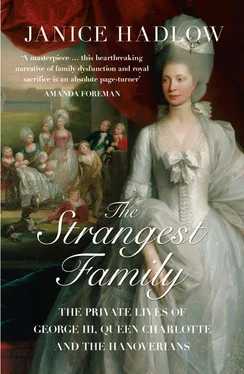She was equally dismissive of the Duke of Cumberland, whom she referred to with heavy irony as ‘her great, great fat friend’, and who had also refused to assist in paying Frederick’s debts. 51She rebuffed all his attempts to build a friendship with his nephew. Augusta rarely missed an opportunity to mock or belittle the duke. ‘The young Prince George had a great appetite; he was asked if he wanted to be as gross as his uncle? Every vice, every condescension was imputed to the duke, that the prince might be stimulated to avoid them.’ 52More seriously, Augusta accepted absolutely the popular belief – encouraged so assiduously by her husband – that Cumberland harboured unconstitutional designs on the throne. She drilled these into Prince George, who, as the sole obstacle standing in the way of such ambitions, regarded his uncle with nervous trepidation. Once, during a rare meeting alone with his nephew, Cumberland pulled down some weapons he had displayed on his wall to show the young prince; George ‘turned pale, and trembled and thought his uncle was going to murder him’. Cumberland was horrified and ‘complained to the princess of the impressions that had been instilled into the child against him’. 53It was not until after he succeeded to the throne that George shook off the distrust of his uncle nurtured in him by his mother.
Augusta soon found herself without friends. She could not seek the support of opposition politicians except at the risk of provoking the king to remove the prince from her care, and she was too deeply imbued with her husband’s opinions to seek allies from within the royal family. It was a tricky situation for which Dodington could see no immediate resolution. He begged Augusta not to act precipitately, and she assured him that she would do nothing rash and had made no dangerous alliances, insisting that she had ‘no connexions at all’. Dodington found this only too easy to believe. Isolated as she was, without friends, family or supporters, there was little he could offer her except patience, meaning she had no choice but to wait for the king to die. In the privacy of his diary, Dodington was more pessimistic about her prospects, recording his stark belief that she must ‘become nothing’.
*
As Frederick’s family drifted gradually but inexorably away from both their surviving royal relations and the active political heartland, they had only themselves to rely upon for company. In the mid-1750s, all Augusta and Frederick’s children were still alive; fourteen years separated the eldest, Augusta, from the youngest, baby Caroline, born five months after her father’s death and named to please her grandfather. In the 1930s, the historian Romney Sedgwick commented that ‘as a eugenic experiment, the marriage could not be considered a success’. His remark, though callous, contained an element of truth. Five of Frederick and Augusta’s offspring died either in childhood or in their twenties, and two were sickly from birth. Elizabeth, the second daughter, was thought by Walpole to have been the most intelligent of all the family – ‘her parts and applications were extraordinary’ – but her figure ‘was so very unfortunate that it would have been impossible for her to be happy’. 54She died in 1759, probably from appendicitis. Louisa, the third daughter, died at nineteen, having suffered from such bad health that even her aunt, Princess Amelia, ‘thought it happier for her that she was dead’. 55The youngest son, Frederick, ‘a most promising youth’, according to Walpole, died at sixteen of consumption.
Prince George was considered to be one of the best looking of Frederick’s family; he was also, as a child and a young man, among the healthiest. His elder sister Augusta, whose grasp on life had seemed so tenuous after the thoughtless theatrics surrounding her birth, grew into an equally resilient child, although her looks were never much admired. Walpole thought ‘she was not handsome, but tall enough, and not ill-made; with the German whiteness of hair and complexion so glaring in the royal family, and with their thick yet precipitate Westphalian accent’. 56She was eager, lively and boisterous, resembling her brother Edward in her love of a joke. William, Duke of Gloucester, the third brother, was as fair as Augusta and Edward, but of a very different disposition. Walpole, who knew him well, summed him up as ‘reserved, serious, pious, of the most decent and sober deportment’. He closely resembled his eldest brother, whose favourite sibling he later became. Henry, who became Duke of Cumberland after his uncle’s death, was small like his father ‘but did not want beauty’. He had, however, ‘the babbling disposition of his brother York, though without the parts or condescension of the latter’. His youth, concluded Walpole severely, ‘had all its faults, and gave no better promises’. 57The toddler Caroline was remarkable at this stage only for her beauty; the ‘German whiteness’ that contemporaries found so ‘glaring’ in her brothers and sisters had in her become a golden blonde. Taken together with her blue eyes and round, pink face, she was by far the prettiest of the family.
Dodington’s diary is peppered with glimpses of ‘the children’, flitting silently round the edges of the world in which he and Augusta occupied centre stage. Always mute, they move as an undifferentiated royal pack. ‘The children’ are sent to prayers; ‘the children’ come in to dine; ‘the children’ retire. Occasionally, the older siblings emerged from the group and joined their mother in simple, family pleasures and games. Dodington was excessively proud of his occasional invitations to join the family in such informal moments, and recorded them with palpable satisfaction. In November 1753, he went to Leicester House ‘expecting a small company and a little music; but found no one but Her Royal Highness. She made me draw up a stool, and sit by the fire with her. Soon after came the Prince of Wales and Prince Edward and then the Lady Augusta, all quite undressed, and took their stools and sat round the fire with us. We sat talking of familiar occurrences of all kinds till between 10 and 11, with ease and unreservedness and unconstraint, as if one had dropped into a sister’s house that had a family to pass the evening.’
Gentle, unforced intimacy of this kind represented Augusta’s household at its best. But while Dodington strongly approved of such warm domestic scenes, he knew in his heart that they were only part of what was required to prepare the older boys for their future lives. He added a wistful postscript to his lyrical description of his quiet night at home with royalty. ‘It was much to be wished,’ he wrote, ‘that the princes conversed familiarly with more people of a certain knowledge of the world.’ 58At a time when George should have been learning how to conduct himself in society, he was utterly removed from it. By 1754, when George was sixteen, even Augusta had begun to worry that the narrow existence she had created for her son was failing him. She confessed to Dodington that she too ‘wished he saw more company – but whom of the young people were fit?’ 59She recognised that her eldest son needed more experience of life, but could not reconcile this with her increasingly dark vision of what lay beyond the secure walls of home. For Augusta, whose character took on an ever bleaker cast in the years after her husband’s death, the world was a wicked and threatening place and it was her first duty to protect her children from its wiles. Wherever she looked, she saw only moral bankruptcy. She complained at great length to Dodington of the ‘universal profligacy’ of the youthful aristocrats who might, in other circumstances, have become her children’s friends. The men were bad enough, but the women were even worse, ‘so indecent, so low, so cheap’. 60Beyond the inner circle of the family, everyone’s behaviour, motives and desires were suspect; no one was really to be trusted. Exposed to temptation, even her own sons might not have the inner strength to resist it. The preservation of an untested virtue, secured by isolation and retirement, was thus the key foundation of their upbringing. ‘No boys,’ commented William, Duke of Gloucester, in middle age, ‘were ever brought up in a greater ignorance of evil than the king and myself … We retained all our native innocence.’ 61In the end, Augusta’s instinctual desire to protect her children from the lures of the world proved stronger than her rational understanding that they must one day learn to master it.
Читать дальше












